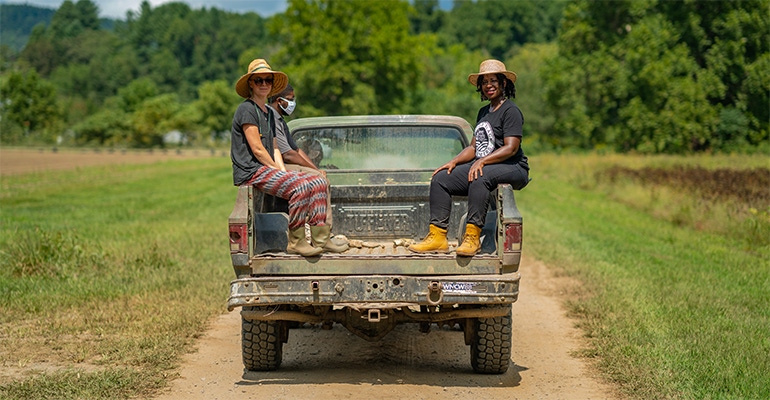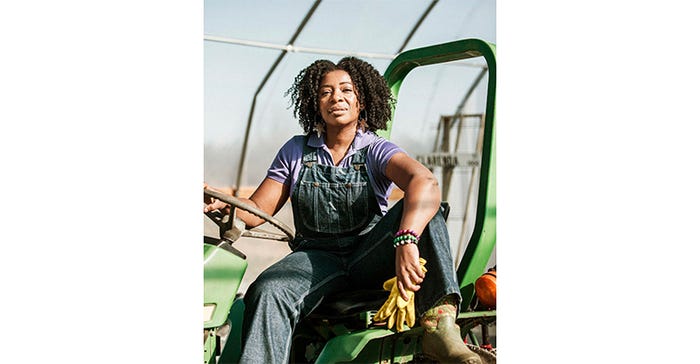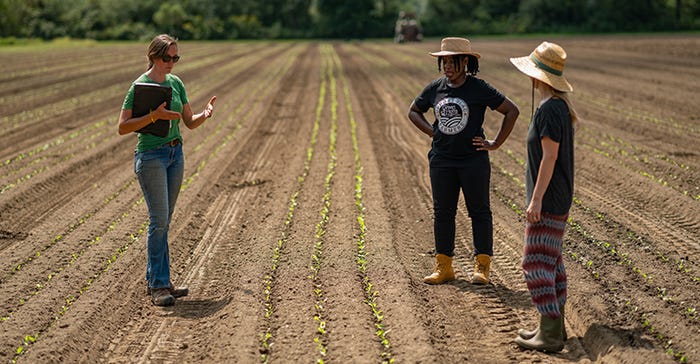Green Heffa Farms, Gaia Herbs work together to help BIPOC farmers
Creating more inclusive, diverse partnerships requires growers and brands to share more knowledge. See how these two businesses embraced an opportunity.
July 5, 2022

Clarenda “Cee” Stanley, the founder and CEO of Green Heffa Farms didn’t initially want to be a farmer. She’d spent her childhood living on her grandparents’ farm in Annie Manie, Alabama.
“Farming was something I was running from,” Stanley says. “I didn't like the lifestyle. It seemed very challenging. There was never McDonald's money. I said no and headed to the city.”
But eventually, the agrarian lifestyle called her back.
At the time, Stanley was a global environmental fundraiser, having worked at The Nature Conservancy, most recently as the senior principal gifts officer. But her husband at the time wanted to farm. Hemp was being grown in a pilot program in North Carolina. After inheriting a family farm, Stanley met the state’s requirement to show proof she’d had previous years of farm income.
In 2018, she co-founded Green Heffa Farms, after purchasing 14.84 acres in Liberty, North Carolina, becoming one of the first Black women licensed in the state. By 2020, she was divorced and running the farm on her own.
“I had this property, but I wasn’t sure what to do with it,” says Stanley, who has also used the last name of Stanley-Anderson. “I had an idea of what farming was. I still didn’t care for it, but I also needed a safe space to heal.”
Now, she runs Green Heffa Farms, a Certified B Corporation organic farm in North Carolina that grows medicinal plants and herbs for custom botanical blends to be used in teas and steams.

The path to get here hasn’t been easy.
“Being a Black woman, I'm on the opposite end of who agriculture was designed to benefit,” says Stanley, a fifth-generation farmer. “It was never designed with me as leadership, it was designed with me as labor.”
That’s a mindset Stanley’s been trying to change for years. She’s still aghast when she walks into a room and others mention how it’s great to see more Black women are getting into farming.
“Black women in farming is not a new movement,” Stanley says. “Who the hell do you think farmed before?”
To help other BIPOC farmers, Stanley created the Sow Green Society, a monthly membership society in 2020 to help “womxn farmers who want to create financially sustainable boutique farming businesses that give back.”
“It’s aspiring and current agricultural businesses,” says Stanley, who is mentoring 18 participants. “I work with them weekly. It’s basically a brain dump where I share lessons I’ve learned.”
Stanley’s work caught the attention of Alison Czeczuga, director of sustainability and social impact at Gaia Herbs who heard Stanley speak at an Organic Growers School conference.
“She talked a lot about racial equity and what companies and systems will need to do for hemp to realize its true potential,” Czeczuga says. “It got me thinking about Gaia’s role in medicinal herb farming and being a regenerative company.”
After hearing Stanley and environmentalist Winona LaDuke speak, Czeczuga says Gaia Herbs offered eight entrepreneurs $5,000 grants over a two-year period.

Then Stanley challenged Gaia Herbs to do more.
“She posed the question to us, ‘Do you want to keep giving grants or do you really want to try to be more systemic about how you approach this issue?'” Czeczuga says. “Cee is a very inspiring and powerful woman who will speak truth to the way things are. She's comfortable with being uncomfortable and asking the tough questions.”
It became clear that one of the ways Gaia Herbs could better support BIPOC farmers and entrepreneurs was by sharing its institutional knowledge about growing and manufacturing practices, she says.
That’s led to “an organic partnership,” where Stanley co-developed Gaia Herbs’ Equity Partnership Program, a two-year partnership program focused on helping BIPOC farmers and herbalists. Stanley, the pilot program's inaugural farmer, has received a $2,500 honorarium in the past two years.
“A lot of it is just opening access to farmers and creating the opportunity to share knowledge and share skills,” Czeczuga says.
The “seed to shelf” program has included, based on Stanley’s suggestions, sharing knowledge of what is important to farmers through the value chain. That’s included Gaia Herbs' sharing tips about how to make seed selection and source seeds; best regenerative agriculture practices including composting, cover cropping and low tillage techniques and harvesting techniques; and best practices for quality assurance and control for good manufacturing practices that are FDA compliant.
“Long term, it’s about bringing more farmers of color into the herbal world, both for Gaia suppliers, as well as an impact with the industry,” Czeczuga says. “It's also been a learning experience for Gaia because we don't have a diverse value chain within the United States. That’s important to us, but in order to do that we’ve had to rely on partnerships and be very intentional about it.”
In mid-June, that included the first-ever “Gathering at Gaia Herbs” where Stanley and nine members of her Sow Green Society were brought to Gaia Herb’s 350-acre property for two days of training.
“It was learning more about their regenerative organic growing practices, some of which they produce on-site, but we also got to go behind the scenes to see how they manufacture and ensure quality,” Stanley says. “We also got connected with their sourcing teams to understand how these relationships are created.”
About the Author(s)
You May Also Like




